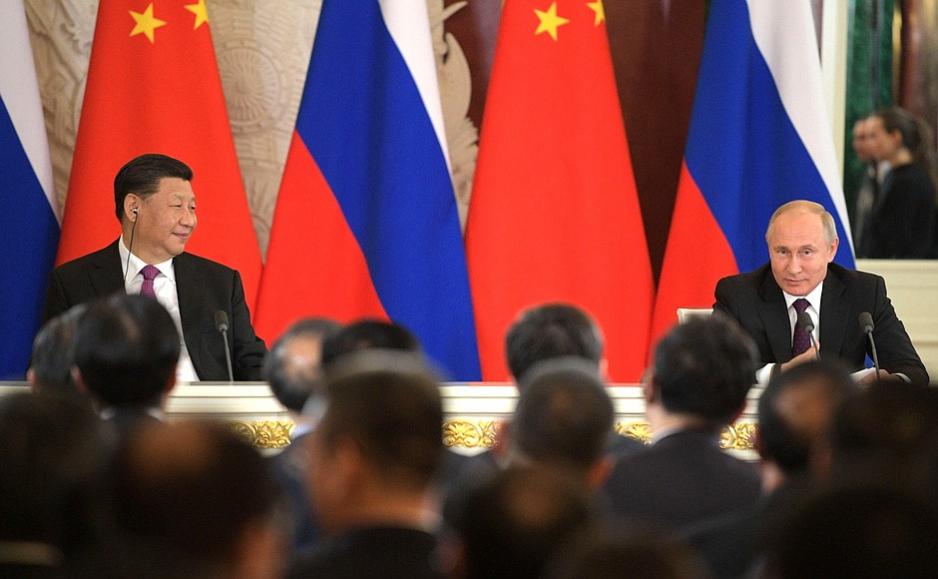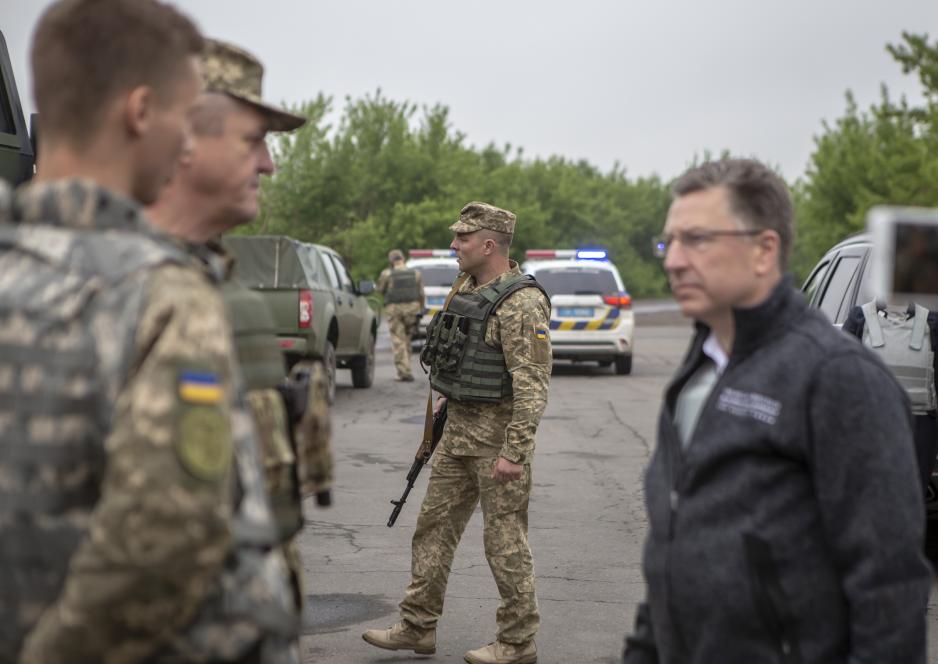Russia Looks to China, but Wants to Return to Europe

Russian President Vladimir Putin and Chinese President Xi Yinping celebrating 70 years of diplomatic relations betwwen their two countries in Moscow last June. (Photo: Press Office of the Russian President)
There is no alternative to European cooperation for Russia, argues professor Vyatsyeslav Morozov. Even if the Chinese influence is likely to increase, Russia prefers a pro-European course in the longer run. Last weekend’s exchange of prisoners with the Ukraine may be the beginning of the end of the sanctions regime.
Ukrainian president Volodymyr Zelenski perconally received each and every one of the 35 newly released Ukrainian prisoners who Saturday landed at the Borisplo Airport outside Kiev.
This is the most important prisoner exchange until now in the five year-long war between the Ukraine and Russia. Saturday’s events may bring new life to the work of establishing a lasting peace solution in a conflict that has taken 13,000 lives so far and led to a crisis in the relationship between Russia and the West.
Sanctions and counter-sanctions
The EU and a long line of other western countries, Norway included, introduced a series of economic sanctions against Russia in the wake of the Russian annexation of the Crimea in the spring of 2014.
Amongst the most important ones are the ban on investments in the Crimea, sanctions towards the bank, energy and defense sectors, as well as a entry ban (denied visas) for a series of persons close to the Russian elite. Nor does the European Investment Bank fund projects in Russia anymore.
The Russian countersanctions banned the import of food, such as vegetables, fruit, meat, dairy and fish.
As for Norway, the sanctions have led to less cooperation about offshore oil and gas activities as well as the loss of a significant fish market. In 2013, Russia accounted for 11 percent of the overall Norwegian seafood export.
A flirt, but no marriage
Professor of EU-Russia relations at the University of Tartu, Estonia, Viacheslav Morozov, says Russia is still orienting itself towards Europe, despite the relationship today being “near-confrontational”.
- There is still a lot of interaction and cooperation on business and people-to-people level. There is a vast increase in tourism both ways, so in that context I am rather optimistic. The way I see it, there is no other way for Russia but a new pro-European direction. Though I do not know when this will happen, Morozov says to High North News.
The public demonstrations that led to the downfall of President Viktor Yanukovich in the winter of 2014 as well as the Russian annexation of the Crimea in March that year have brought relations between Russia and the West to a freezing point.
Several attempts to end the bloody war in East Ukraine, the Minsk accords, have not led to a lasting political solution. In the vacuum from western sanctions aimed at Russian economy and industry, as well as the Russian response with import ban on western food, China has entered the scene with finances and competences.
Morozov, who last week visited the annual Russia Conference of the Norwegian Institute of International Affairs (NUPI), nevertheless refutes the idea that the Chinese flirt with Russia will lead to a lasting marriage.
- China is becoming increasingly important and there is a lot of cooperation between Russia and China about trade and joint projects. Despite that, Russia will not find anchoring in China as Chinese politics are very pragmatic and based on its own narrow interest, Morozov says.
He explains that most inhabitants in Russia live in the European parts of the country, where China is still regarded as something foreign and unknown.
- I cannot imagine how China nor Russia were to benefit from an alliance, he says.
China is still regarded as something foreign and unknown by most Russians.

Professor of EU-Russia relations at the University of Tartu, Estonia, Viacheslav Morozov. (Photo: Amund Trellevik)
Chinese money in the Arctic
Chinese capital has become more important for Russia following the introduction of the western sanctions in 2014. In April, news broke that two Chinese state-owned oil companies acquire 20 percent of Novatek’s LNG project “Arctic LNG 2”.
Novatek is Russia’s largest privately owned gas company and the company currently has several major industrial projects in the Arctic parts of Russia, amongst others on the Yamal peninsula in northern Russia.
In June, it was also announced that Chinese Huawei is to build russia’s 5G network.
Igor Denisov, researcher at the Moscow State Institute of International Relations (MGIMO), says that Chinese investments in Russia will increase over the coming years. He refers to Novatek's being hit by American sanctions and that several Russian companies struggle to find capital.
- Russia does not want a formal alliance with China; however, Moscow is interested in military and technological cooperation with the country. Mongolia, Japan and South Korea are also important partners for Russia in Asia, Denisov says, stressing that Sino-Russian relations experienced a new spring following the western sanctions.
- When asked whether China and Russia are partners or competitors, I will say: We wanted China to enter the Arctic Council. And yes, we welcome Chinese investors in the Arctic. However, we do not welcome the Polar Silk Road, said Denisov, who also attended NUPI’s Russia conference.
Denisov also points out that a close personal relationship between Russian president Vladimir Putin and Chinese president Xi Yinping is a key reason for their countries’ good relationship.
Testing the waters for peace
Morozov now sees signs that the parties of the Ukraine conflict are considering a potential peace solution, and that this solution is beginning to take shape. The weekend’s exchange of prisoners between Russia and Ukraine involved a series of high profile prisoners, such as Ukrainian film director Oleg Sentsov and Volodymyr Tsemakh. The latter is described as a key witness in the shooting down of the Malaysian Airlines flight 17 in the summer of 2014, which killed 298 people.
American Republican senator Mike Lee visited Moscow this weekend. In meetings with the Chairman of the Russian Parliament’s Foreign Affairs Committee, Konstantin Kosatchev, Lee said that the USA and Russia are at their best when they cooperate about joint interests, according to AP.
On Saturday, US President Donald Trump tweeted a description of the prisoner exchange as “very good news, perhaps a first giant step to peace”.

US Special Envoy to the Ukraine, Kurt Volker, visiting eastern Ukraine in May 2018. (Photo: The American Embassy in the Ukraine).
Russia will probably have to give up more than the West as Russia, objectively speaking, is the weaker part.
However, the USA has been clear that the Crimean peninsula is to be returned to the Ukraine prior to any potential lifting of the economic sanctions against Russia. Morozov argues that the Crimea is a lost case for the Ukraine regardless, and that a peace agreement now is about working out a compromise that both parties can sell off as a victory to their inhabitants.
- We currently see an early phase of what may become a lasting solution in the Ukraine. I do not want to comment on the details here yet; nevertheless, there appears to be an understanding of how a compromise may look. In that context, the European marked till gradually be opened towards Russia and Russia will be open to Europe, Morozov says.
He argues that a solution in the Ukraine will be a step towards agreement in several difficult cases between Russia and the West.
- The Sanctions were introduced to try and make one side change its behavior. We see no end to the sanctions on a short-term basis, however, if we take an optimistic point of view I will argue that in a few years’ time, it will be possible to establish a solution with the Ukraine, if the Ukraine is willing to open the way for a very painful process that has the lifting of sanctions as its expressed goal, Morozov says.
- Russia will probably have to give up more than the West as Russia, objectively speaking, is the weaker part. However, it has to look like a compromise for the Russian government in order for it to be able to sell it to the Russian population.
- How can both sides avoid losing face in a process like this?
- Any solution in the Ukraine where there is a form of federalization or autonomy for the eastern parts of the country will be a solution that Russia can sell to its citizens. The Crimea is a different story, and personally I do not believe there is any way back for the Crimea. One may be able to establish an agreement about a new referendum, though if everyone who left the Crimea, including the Tartars, were to return, I still do not see how such a referendum can lead the Crimea to return to the Ukraine. A majority will still vote pro-Russia, Morozov says.
This article was originally published in Norwegian and has been translated by HNN's Elisabeth Bergquist.

